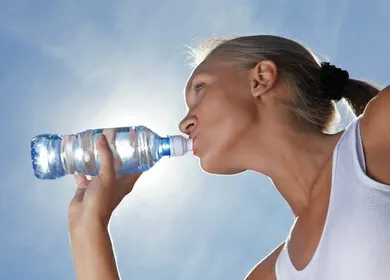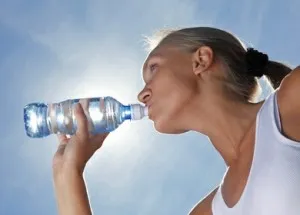
- Share on Facebook640
- Share on Pinterest
- Share on Twitter
When choosing items labeled as ‘healthy,’ we need to be very careful. Many corporations have caught onto the fact that more and more consumers are seeking healthier options, and have tailored their marketing towards this end.
The following are five of the worst foods that are labeled as, and often thought of by consumers as, healthy options.
Energy and Protein Bars: Marketed as a ‘healthy’ alternative to candy bars, as well as a nutrition-packed snack to boost energy during workouts, energy bars are often filled with synthetic ingredients that can be damaging to your health. Also, many brands use soy protein, which has been shown to disrupt hormonal balance.
Furthermore, the chemicals and high temperatures used to process the protein include nitrites, and makes most of the nutrients that the soy does provide unusable by the body.
Similarly, the protein qualities of whey protein are also destroyed at high temperatures, diminishing the nutritional value of bars using whey instead of soy.
Energy and protein bars also often contain high fructose corn syrup and maltodextrin, usually from GMO corn. The synthetic vitamins loaded into these bars do little to redeem them health-wise.
Instant Oatmeal: Whole oat kernels, or oat groats, are not a terrible breakfast option, aside from amping up your carbohydrate quotient, which can cause unwanted weight gain. Instant oatmeal, however, is nowhere near a health food, although some brands have erroneously labeled it as ‘heart healthy’ to increase sales.
These types of oats are rolled, steamed and precooked, destroying much of the minerals that were in the whole grain to start out with. They also often contain sweeteners such as sugar or high fructose corn syrup, along with artificial flavors, colors, and often trans fats in the form of partially hydrogenated oils.
To promote color retention, instant oatmeals are often treated with sodium sulfite – not something you want in your body. Additionally, very few ‘fruit’ varieties actually contain any trace of real fruit. McDonald’s ‘Fruit and Maple Oatmeal,’ for example, advertised as a healthy breakfast option, actually contains more sugar than a Snickers bar.
Boxed Granola: A type of cold cereal made from rolled oats and various other grains, toasted until crispy, granola has long been advertised as the pinnacle of health in cereal choices. However, along with frequently containing refined carbohydrates, commercial varieties often contain heaps of sugar, corn syrup and chemical fillers. In his book, Food Is Your Best Medicine, Dr. Henry G. Bieler states that when carbohydrates are cooked in fat, such as in the case of granolas, the chemical reactions that occur produce molecules that the human body cannot process.
He explains that these indigestible molecules can build up in your system and cause toxicity, resulting in disorders ranging anywhere from colds to cancer, to heart disease, depending on one’s individual constitution.
Vitamin Water: Although catchy nomenclature claims that it will give you ‘energy,’ ‘focus’ or ‘endurance,’ vitamin water is much more likely to pave the way for a sugar crash. One bottle of vitamin water actually contains more calories and sugar than an equivalent serving of Coke.
Pure sugar is often masqueraded on the ingredient label as ‘crystalline fructose,’ in an attempt to throw you off. Nowadays, many people guzzle this beverage as if it were water, and this only leads to dehydration, due to the sheer amount of sugar content.
The vitamins included are in synthetic form, making them much more difficult for the body to absorb and process than their natural counterparts. To receive your daily vitamin quotient, drink plain and simple water, and munch on some organic fruits and veggies – you will avoid the sugar overload and resulting dehydration that vitamin water brings to your body.
 Bottled Water: The luxury of water packaged in an easy-to-carry, readily-available container is not worth the cost to your wallet, the environment, or your health. According to Food and Water Watch, bottled water produces approximately 1.5 tons of plastic waste per year, and requires about 47 million gallons of oil per year to manufacture.
Bottled Water: The luxury of water packaged in an easy-to-carry, readily-available container is not worth the cost to your wallet, the environment, or your health. According to Food and Water Watch, bottled water produces approximately 1.5 tons of plastic waste per year, and requires about 47 million gallons of oil per year to manufacture.
Statistics show that about 80 percent of the plastic waste from bottled water is simply discarded, not recycled, and that does not include the huge amount of bottles that end up in our oceans, putting marine life in jeopardy. Bottled water can also be hazardous to your health, as many of the bottles used still contain bisphenol A (BPA).
BPA mimics estrogen in the body, and has been shown by numerous studies to tamper with hormonal balance, especially in young children. An additional drawback of buying bottled water is that this practice takes attention away from the maintenance of safer municipal water systems.
Don’t be fooled by clever marketing; not everything labeled as healthy, or sold in health food stores, is truly good for you. To get the most nutritional punch from your diet, choose natural, organic fruits, vegetables and meats – if you choose to include them – and be sure to carefully read the ingredient labels of anything in a pretty package.
-The Alternative Daily
Sources:
http://www.dietriffic.com/2012/10/03/is-oatmeal-healthy/
http://social.popsugar.com/Truth-About-Vitamin-Water-541747
http://www.healthiertalk.com/granola-not-good-you-3131
http://articles.mercola.com/sites/articles/archive/2003/05/21/energy-bars-part-two.aspx
http://www.wisegeek.com/what-is-granola.htm
http://usatoday30.usatoday.com/news/health/bpa.htm
- Share on Facebook640
- Share on Pinterest
- Share on Twitter

